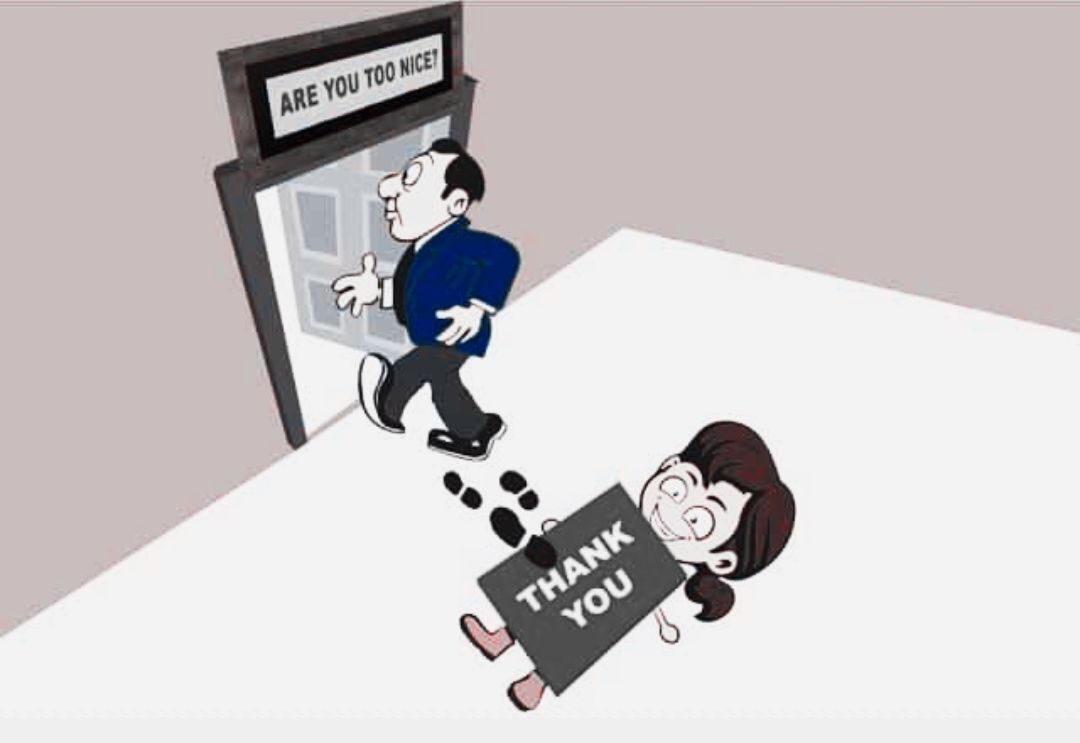The final moment I finally stopped Being Too Nice, that led me to create and enforce boundaries, was something I allowed clients to do all the time – be late without consequence, while wasting my time and energy.
What I thought was proving my worth, kindness, and generosity, was just demonstrating what little self-respect I had.
This realization triggered a shame-spiral of every missed opportunity, every fake friendship, and every ounce of stress and mental anguish that was fueling a tremendous amount of resentment.
As a people-pleaser, I wanted people to think I was nice. Sacrificing myself felt like proof I was “good.”
Empower yourself with boundaries and self-respect when you get your copy of Stop Being a Doormat.
My Breaking Point
That delusion finally broke with a single, defining incident: a client showed up 90 minutes late to an appointment. She was bubbly, carefree, and clearly unbothered by the hour-and-a-half delay. Normally, I’d have shrugged it off by Being Too Nice – with a forced smile, maybe even an “Oh, no problem!”
But this time… I couldn’t.
I was seething, and for once, I let it show.
When I refused to help her, she looked surprised. She pointed out that I’d never had an issue with her tardiness before. And she was right! I had taught her to expect me to Be Too Nice because I’d never respected myself enough to demand it.
As expected, I lost her as a client that day.
What she doesn’t know is that she changed my life. Her lack of respect towards me was a lesson that would push me to start prioritizing myself — my time, my energy, my own sense of value.
The Cost of Being Too Nice
The real damage of Being Too Nice and people-pleasing goes way beyond a packed schedule or strained smile. It takes a deep psychological toll, leaving you exhausted, frustrated, undervalued, and constantly feeling like you’re not enough. It flushes your self-worth down the toilet and tells you you’re not worth standing up for.
Living with a people-pleasing mindset is the opposite of the mindset of The Successful Asshole. They operate with enviable confidence that they deserve success, and people respect their directness, assertiveness – even their dominance. The world rewards them with wealth, prestige, and influence.
Meanwhile, you find me sitting on the sidelines, with a fake smile and hoping someone would notice how “nice” I was.
No one noticed.
Instead, Being Too Nice and people-pleasing made me cycle through feelings of frustration and inadequacy. Those cycles reinforced my (limiting and false) belief that everyone else’s needs came first, and whatever scraps of time or energy were left were all I deserved.
My Small “Asshole” Moves that Don’t Make Me an Asshole
Looking back, losing that client was a small price to pay for the time and respect I’ve since gained. I realized that some of the strategies Successful Assholes use — like clear boundaries and saying “no”— weren’t about being a jerk. They were simply about respect and prioritization. Here’s what I started doing differently:
- Use Confident Language: My language was always cushioned with doubt: “Sorry to bother you, but…” or “If it’s okay with you…”I shifted to phrases like, “I need” or “I want.” Those small tweaks now make me sound more direct and trustworthy.
- Set Boundaries: My lack of boundaries screamed that my time was up for grabs. I learned that boundaries don’t have to be grand ultimatums; they’re just realistic expectations I set for myself.Instead of hoping someone would respect my time, I now say things like, “Let’s meet at [specific time] so we can make the most of our time together. If that’s not going to work, let’s reschedule.” It’s a small but crucial shift from hoping for respect to expecting it.
- Saying No Strategically: Saying “no” changed my life. I used to think “no” made me seem unhelpful or selfish. What I didn’t realize was that saying “yes” to everyone turned me into someone I didn’t even like —resentful, angry, and exhausted.Now, I say no to protect my time and energy without apology. My go-to responses are:
a. “I’m not able to do that, but thanks for thinking of me.”
b. “This sounds like something [so-and-so] would be great at handling.”
c. “I can’t join you for that, but I’d be happy to share some resources.”Each of these responses says “no” without guilt or awkward explanations.
Trading Fake Niceness for Real Self-Respect
I realized that Being Too Nice and people-pleasing didn’t make me “good” – it made me easy target for other people’s nonsense.
Since drawing my own boundaries, I’m not constantly frustrated, resentful, or exhausted. And the funny thing? People respect me more now than they ever did when I was bending over backward to keep everyone happy.
Learning to say “no” strategically and stand up for myself didn’t make me an asshole. It made me someone with self-respect. And that’s worth way more than “nice.”






